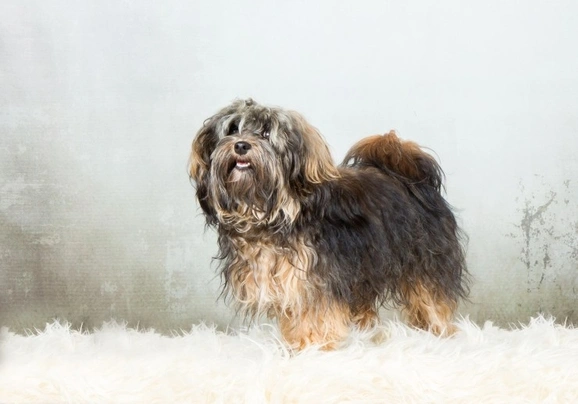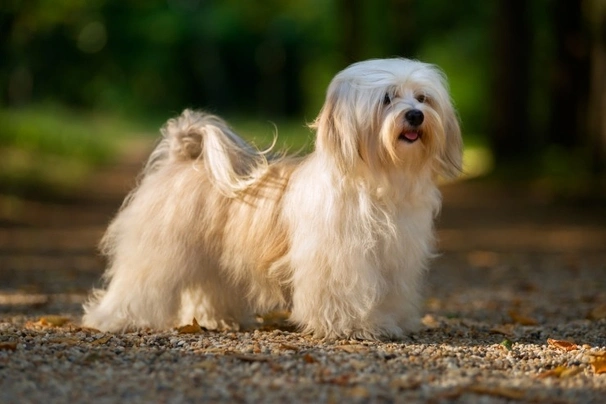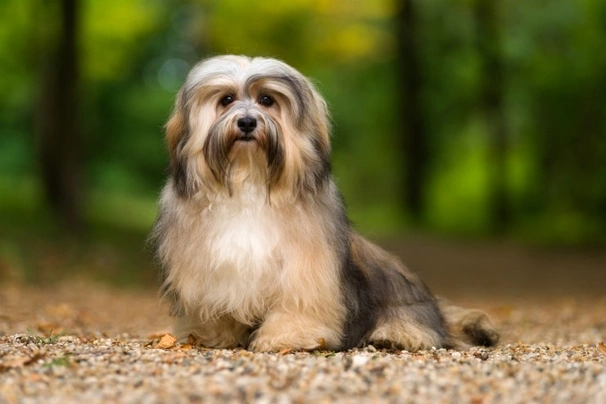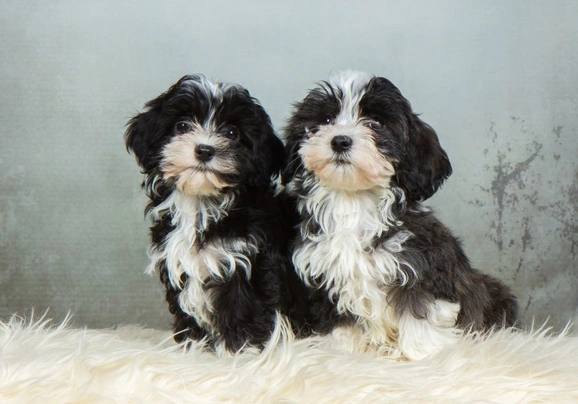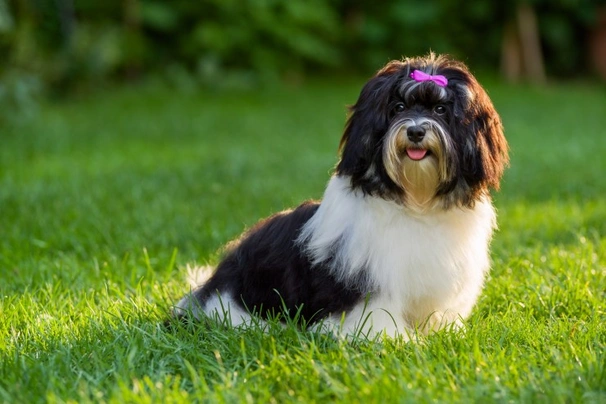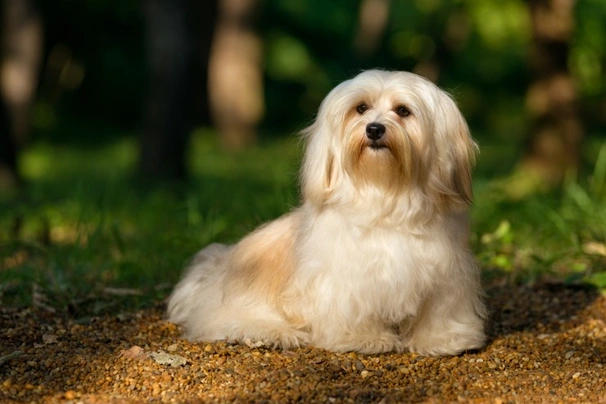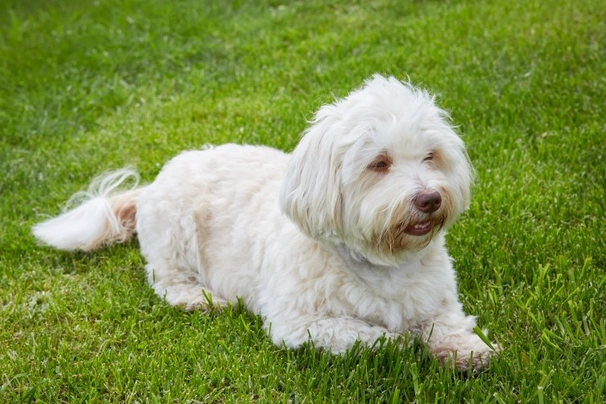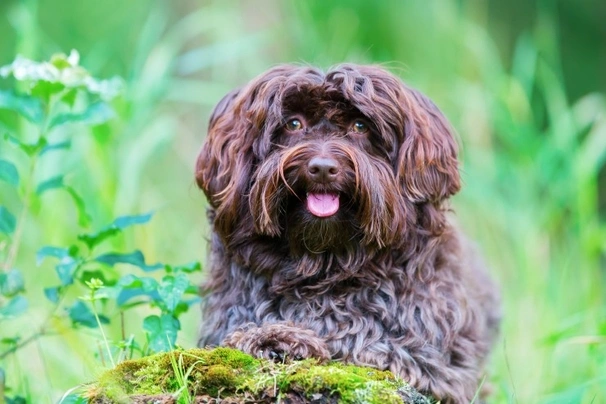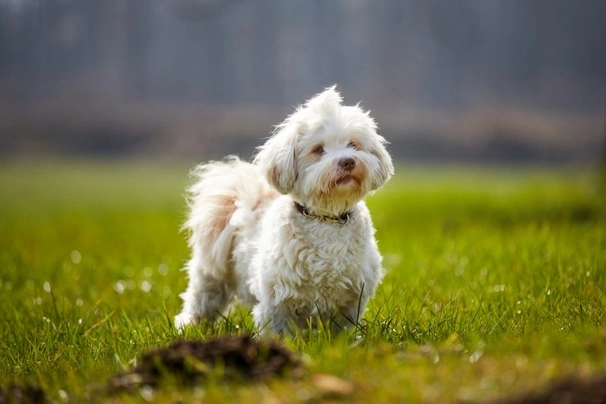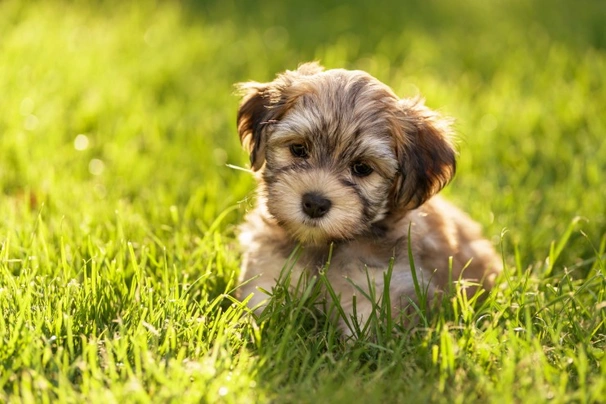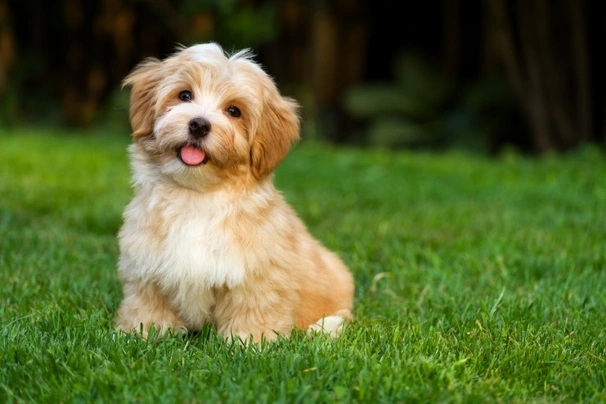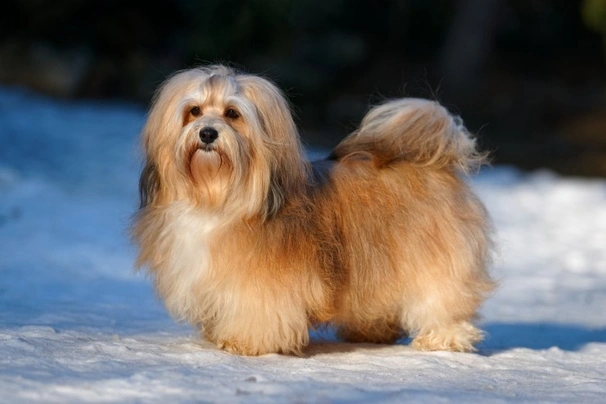Pets
Pets for studWanted petsBreedersAccessories & services
Knowledge hub
Support
Support & safety portalHavanese
Pros
Cons
Introduction of the Havanese
The Havanese has become a popular choice with people all over the world thanks to their charming looks and delightful natures. They are lively little dogs known to be intelligent affectionate forming very strong ties with their families. The downside to this being that they hate being on their own and can suffer from separation anxiety. With this said the Havanese is better suited to households where one person stays at home so they always have company.
Once known as the Havanese Silk Dog these little dogs are quite high maintenance in the grooming department but they are not heavy shedders which means they are a great choice for anyone who is house proud or who suffers from pet allergies. The Havanese is a great choice for families with older children rather than toddlers and they also make loyal and loving companions for older people too.
History of the Havanese
The Havanese boasts an interesting lineage being related to many other breeds native to the Mediterranean. This includes the Bichon Frise the Maltese the Coton de Tulear the Lowchen and the Bolognese. However the breed was developed in Cuba and it is thought that several of these breeds are in their ancestry with the first white Bichon-type dog having been introduced to Cuba during the 16th and 17th Centuries. It is thought that these little dogs resembled the Bichon Teneriffe a breed that is now extinct.
The other breeds thought to have been used to create the Havanese were Poodle-type dogs which were introduced to Cuba during the early part of the 19th Century when Europeans immigrated to the island. They are also thought to have other breeds in their lineage which includes the Portuguese Water Dog and the Water Spaniel. They were developed to be companion dogs for the wealthy and well to do which in short meant the Havanese was a sought after and expensive dog even back then.
During the Cuban revolution which took place in 1959 breed numbers fell dangerously low due to many Cubans leaving the island taking their pets with them. Some dogs however were left behind and were to become the pets of lower classes which as a result saved the breed from vanishing altogether. With this said there are no records of the breed in Cuba during the following thirty years. In their native Cuba the Havanese is known as the Habanero and they are the country's National Dog.
These little dogs are quite unique in many ways because as previously mentioned over time they were developed in their native Cuba without any outside influences. This resulted in them having very specific traits one of which is they are extremely heat tolerant all thanks to their rather unique coats which are profuse and very much like raw silk which provides valuable insulation when temperatures are high.
The Havanese became very popular in England during the mid-eighteenth century with Queen Victoria owning one of these charming little dogs. Charles Dickens was another well-known person to own one. Over time many Havanese were exhibited at shows both in the UK and Europe. In their native Cuba too the Havanese were fast becoming a popular and were made the island’s national dog.
The Havanese we see today are all descendants of eleven dogs that were taken out of Cuba to America where the breed was further developed. With this said not much has changed in the breed with dogs looking very much like the Havanese that were around back in the eighteenth century. It was in the 1970s that Bert and Dorothy Goodale began breeding the Havanese in the States having purchased some dogs from Cubans who were in exile.
The Cuban Havanese Club was founded in 1991 and a breeding programme was once again set in place in their native land. In the UK Barbara Benersen imported four dogs from Europe and began a breeding programme which established the breed in England. Over the years their breed numbers have increased with more and more people now showing a real interest in sharing a home with a Havanese not only in the UK but elsewhere in the world too.
Interesting facts about the breed
- Is the Havanese a vulnerable breed? No they are among some of the more popular dogs in the UK ranking in the top 100dog breeds on the Pets4homes website
- They belong to the "Bichon" family of dogs which includes the Coton de Tulear Maltese Lowchen Bichon Frise and Bolognese all of which are breeds that are native to the Mediterranean
- The Cuban Havanese Club was founded in 1991
- The Havanese is Cuba's national dog
- Their coats are quite unique and insulate dogs from the heat
- White coated Havanese may be predisposed to congenital deafness and should be BAER tested
Appearance of the Havanese
Height at the withers: Males 23 - 28 cm Females 23 - 28 cm
Average weight: Males 4.5 - 7 kg Females 4.5 - 7 kg
The Havanese is a small dog but they are sturdy and boast a profuse coat which adds to their wonderful looks. They have slightly rounded heads with a moderate stop and shortish muzzles. Their noses and their lips are black but some brown dogs may have a brown pigment in them. These delightful dogs boast lovely large almond-shaped eyes with a gentle expression that's accentuated by their black rims. If their coat is brown or a shade of brown dogs have lighter coloured eyes and their rims are brown too.
Their ears are quite pointed and they drop down slightly above a dog's eyes. Dogs hold their ears slightly raised. The Havanese boasts a strong jaw with a perfect scissor bite where their upper teeth neatly overlap their lower ones. Their necks are moderately long and their shoulders well laid back. Legs are nice and straight with a moderate amount of bone.
The Havanese is a compact little dog that boasts a nice level topline that rises slightly over their loins. Ribs are well sprung and their belly neatly tucked up. Their hindquarters are quite strong with a nice angle to them and they have small feet that resemble those of a hare. Their tail is well feathered with lots of silky hair and is set high. Dogs carry them over their backs adding to their charming looks and appeal.
When it comes to their coat the Havanese boasts a luxuriously silky soft coat that can be either slightly curled or wavy with their undercoat being just as soft. These charming little dogs come in lots of colours and colour combinations. The acceptable breed colours for Kennel Club registration are as follows:
- Black
- Black & tan
- Black & white
- Brown sable & white
- Chocolate
- Chocolate & white
- Cream
- Cream & tan
- Cream & white
- Cream sable
- Gold
- Gold & cream
- Gold & white
- Gold sable
- Gold sable & white
- Particolour
- Red
- Red & cream
- Red & white
- Sable
- Sable & white
- Tan & white
- Tricolour
- White
Gait/movement
When a Havanese moves they do so with a lively gay springy action. Their legs moving parallel in a straight line as they do.
Faults
The Kennel Club frowns on any exaggerations or departures from the breed standard and would judge the faults on how much they affect a dog's overall health and wellbeing as well as their ability to perform.
Males should have both testicles fully descended into their scrotums and it is worth noting that a dog can be a little lighter or heavier as well as slightly taller or shorter than set out in the Kennel Club breed standard which is given as a guideline only.
Temperament of the Havanese
The Havanese is a lively loyal and affectionate little dog which is why they have found their way into the hearts and homes of many people throughout the world. They are confident outgoing and they are good choice for first time owners. They are intelligent and always eager to please which means they are one of the easier small dogs to train.
However because they are so intelligent these little dogs are also quick to pick up any bad habits if they are allowed to or if they are given the wrong sort of training guidance and direction. Sharing a home with a Havanese is a real pleasure but their training and education needs to start early for them to be truly well-rounded adult dogs.
They are known to be "show-offs" and enjoy nothing more than being the centre of attention. With this said these little dogs need to be given a ton of mental stimulation or they might try to find their own way of entertaining and amusing themselves. Playing lots of interacting games with them is the best solution to preventing any boredom setting in which could result in some unwanted behaviours around the home.
These little dogs thrive on human companionship and do not do well or like being left on their own for even shorter periods of time which is why they are a good choice for people or families who spend most of their time out of the house. The Havanese is the ideal family dog for families where at least one of the household usually stays at home when everyone else is out. If left on their own these little dogs suffer from separation anxiety which can turn into a real problem for both dog and owner.
They also enjoy playing in water and they are known to be strong swimmers but care needs to be taken when they are around any deep ponds or other watercourses. These little dogs also boast having a natural herding instinct and back in their native Cuba they were often used to herd flocks of poultry.
Are they a good choice for first time owners?
The Havanese is a great choice of pet for first time dog owners because they are so amenable and people-oriented loving nothing more than to please and to entertain their families. They are particularly good with older children and people too although playtime can get a bit boisterous at times. They are not the best choice for families with toddlers or very young children.
What about prey drive?
The Havanese is a very social dog by nature and they generally get on well with other animals more especially if they are well socialised from a young age. However this is not to say that a Havanese won't give chase to a smaller pet or animal if they try to run away because they do have quite a high prey drive. As with any other breed introductions should always be well supervised to make sure everything goes smoothly.
What about playfulness?
Havanese have a very playful side to their natures and love to entertain and be entertained. They are known to be a little mischievous when the mood takes them and being so clever they quickly learn what pleases an owner. They enjoy playing interactive games and like taking part in all sorts of canine sports which includes agility.
What about adaptability?
Havanese are highly adaptable dogs and providing they are given enough daily physical exercise combined with as much mental stimulation to prevent boredom from setting in they are just as happy living in an apartment in town as they are living in a house in the country.
What about separation anxiety?
As previously mentioned Havanese form strong ties with their families and dogs are never very happy when they find themselves left on their own for longer periods of time. They are better suited to people who either work from home or in households where one person stays at home when everyone else is out so they are never alone for any length of time which could see a dog suffering from separation anxiety. This can lead to them being destructive around the home which is a dog's way of relieving any stress they are feeling and a way to keep themselves entertained.
What about excessive barking?
The Havanese is known to like the sound of their own voices a little too much which is something that needs to be gently nipped in the bud when a dog is still young being careful not to frighten them. However even with the best of training a Havanese might insist on barking for no reason which can become a problem with neighbours.
Do Havanese like water?
Most Havanese like swimming and will take to the water whenever they can more especially when the weather is hot. However if anyone who owns a dog that does not like water should never force them to go in because it would just end up scaring them. With this said care should always be taken when walking a Havanese off the lead anywhere near more dangerous watercourses just in case a dog decides to leap in and then needs rescuing because they can't get out of the water on their own.
Are Havanese good watchdogs?
They are good watchdogs and would always be quick off the mark to let an owner know when there are strangers about or when something they don't like is going on around them. However rarely would a Havanese show any sort of aggressive behaviour when they are in watchdog mode preferring to keep their distance and bark as a way of alerting their owners.
Intelligence / Trainability of the Havanese
Because the Havanese is an intelligent dog and one that likes nothing more than to please they are easy to train. However they still need to be managed and handled correctly with a firm yet gentle hand to prevent them from picking up any bad habits as well as the good ones. It is all too easy to spoil a Havanese because when they are puppies they are very cute. However owners should start out as they mean to go on which means laying down the ground rules right from the word go.
All dogs like to know their place in the pack and who is the alpha dog in a household and the sooner a puppy understands the "rules" the better behaved they would be. When a Havanese is too spoiled they can develop a condition known as "small dog syndrome" which sees them being unruly and wilful making them harder to live with and handle. As such the first commands a puppy should be taught are as follows:
- Come
- Sit
- Stay
- Quiet
- Leave it
- Down
- Bed
Children and other
The Havanese seems to have an affinity with children and there is nothing they like more than to play interactive games with the kids. However as with other dogs any interaction between children and their pet needs to be supervised by an adult to make sure things don't get too boisterous and out of hand.
These little dogs rarely show any sort of aggressive behaviour when they are around other dogs and if they have grown up with a family cat they are usually fine around them too. However care needs to be taken when a Havanese meets any other smaller animals and pets because their instincts might just get the better of them which could end in a disaster.
Health of the Havanese
The average life expectancy of a Havanese is between 14 and 16 years when properly cared for and fed an appropriate good quality diet to suit their ages.
These little dogs are known to be one of the healthiest and most robust breeds around. They do not suffer or develop any of the major health issues that so frequently plague other pedigree dogs. With this said there have been reports of some Havanese suffering from eye issues and as such the Kennel Club and vets recommend dogs be tested under a voluntary scheme.
- Cataracts
- Hereditary cataracts - reputable breeders would regularly have their dogs screened
- Cherry eye
- Congenital deafness - more especially white coated dogs
More about eye testing
When testing a Havanese for eye issues the tests must be carried out by a qualified veterinary ophthalmologist and this must be registered with the BVA British Veterinary Association and the Kennel Club. Eye screening should be carried out before puppies are sold and the tests should be done when puppies are anything from 6 to 8 weeks old. The results of the tests will establish that a puppy has not inherited congenital cataracts but does not guarantee that other eye issues which includes cataracts might not occur later in a dog's life.
It is worth noting that dogs with hereditary cataracts will not show any signs of there being a problem until they are around 6 months old and as such all breeders must have their stud dogs annually screened before using them in a breeding programme. With this said all Havanese whether breeding stock or not should be screened annually for the welfare of the dog.
What about vaccinations?
Havanese puppies would have been given their initial vaccinations before being sold but it is up to their new owners to make sure they have their follow-up shots in a timely manner with the vaccination schedule for puppies being as follows:
- 10 -12 weeks old bearing in mind that a puppy would not have full protection straight away but would be fully protected 2 weeks after they have had their second vaccination
There has been a lot of discussion about the need for dogs to have boosters. As such it's best to talk to a vet before making a final decision on whether a dog should continue to have annual vaccinations which are known as boosters.
What about spaying and neutering?
A lot of vets these days recommend waiting until dogs are slightly older before spaying and neutering them which means they are more mature before undergoing the procedures. As such they advise neutering males and spaying females when they are between the ages of 6 to 9 months old and sometimes even when a dog is 12 months old.
Other vets recommend spaying and neutering dogs when they are 6 months old but never any earlier unless for medical reasons. With this said many breeds are different and it is always advisable to discuss things with a vet and then follow their advice on when a dog should be spayed or neutered.
What about obesity problems?
Some Havanese gain weight after they have been spayed or neutered and it's important to keep an eye on a dog's waistline just in case they do. If a dog starts to put on weight it's important to adjust their daily calorie intake and to up the amount of exercise they are given. Older dogs too are more prone to gaining weight and again it's essential they be fed and exercised accordingly because obesity can shorten a dog's life by several years. The reason being that it puts a lot of extra strain on a dog's internal organs including the heart which could prove fatal.
What about allergies?
Some Havanese are prone to suffering from allergies and it's important for a dog to see a vet sooner rather than later if one flares up. Allergies can be notoriously hard to clear up and finding the triggers can be challenging. With this said a vet would be able to make a dog with an allergy more comfortable while they try to find out the triggers which could include the following:
- Certain foods containing high levels of grain and other cereal type fillers
- Airborne pollens
- Dust mites
- Environment
- Flea and tick bites
- Chemicals found in everyday household cleaning products
Participating in health schemes
All responsible Havanese breeders would ensure that their stud dogs are tested for known hereditary and congenital health issues known to affect the breed by using the following schemes:
- Eye testing - annual screening is essential
- Congenital deafness - more especially white coated dogs
What about breed specific breeding restrictions?
Apart from the standard breeding restrictions set out for all Kennel Club registered breeds there are no further breed specific breeding restrictions in place for the Havanese.
What about Assured Breeder Requirements?
Currently there are no Kennel Club Assured Breeder requirements for the Havanese but all responsible breeders would have their dogs screened for eye issues which includes hereditary cataracts and other eye issues.
Caring for the Havanese
As with any other breed the Havanese needs to be groomed on a regular basis to make sure their coats and skin are kept in top condition. They also need to be given regular daily exercise to ensure they remain fit and healthy. On top of this they need to be fed good quality food that meets all their nutritional needs throughout their lives.
Caring for a Havanese puppy
Havanese puppies are boisterous and full of life which means it's essential for homes and gardens to be puppy-proofed well in advance of their arrival. A responsible breeder would have well socialised their puppies which always leads to more outgoing confident and friendly dogs right from the word go. With this said any puppy is going to feel vulnerable when they leave their mother and littermates which must be taken into account. The longer a puppy can remain with their mother the better although it should never be for too long either.
It's best to pick a puppy up when people are going to be around for the first week or so which is the time needed for a puppy to settle in. Puppy-proofing the home and garden means putting away any tools and other implements that a boisterous puppy might injure themselves on. Electric wires and cables must be put out of their reach because puppies love chewing on things. Toxic plants should be removed from flowerbeds and the home too.
Puppies need to sleep a lot to grow and develop as they should which means setting up a quiet area that's not too out of the way means they can retreat to it when they want to nap and it's important not to disturb them when they are sleeping. It's also a good idea to keep "playtime" nice and calm inside the house and to have a more active "playtime" outside in the garden which means puppies quickly learn to be less boisterous when they are inside.
The documentation a breeder provides for a puppy must have all the details of their worming date and the product used as well as the information relating to their microchip. It is essential for puppies to be wormed again keeping to a schedule which is as follows:
- Puppies should be wormed at 6 months old
- They need to be wormed again when they are 8 months old
- Puppies should be wormed when they are 10 months old
- They need to be wormed when they are 12 months old
Things you'll need for your puppy
There are certain items that new owners need to already have in the home prior to bringing a new puppy home. It's often a good idea to restrict how much space a puppy plays in more especially when you can't keep an eye on what they get up to bearing in mind that puppies are often quite boisterous which means investing in puppy gates or a large enough playpen that allows a Havanese puppy the room to express themselves while keeping them safe too. The items needed are therefore as follows:
- Good quality puppy or baby gates to fit on doors
- A good well-made playpen that's large enough for a puppy to play in so they can really express themselves as puppies like to do
- Lots of well-made toys which must include good quality chews suitable for puppies to gnaw on bearing in mind that a puppy will start teething anything from when they are 3 to 8 months old
- Good quality feed and water bowls which ideally should be ceramic rather than plastic or metal
- A grooming glove
- A slicker brush or soft bristle brush
- Dog specific toothpaste and a toothbrush
- Scissors with rounded ends
- Nail clippers
- Puppy shampoo and conditioner which must be specifically formulated for use on dogs
- A well-made dog collar or harness
- A couple of strong dog leads
- A well-made dog bed that's not too small or too big
- A well-made dog crate for use in the car and in the home that's large enough for a puppy to move around in
- Baby blankets to put in your puppy's crate and in their beds for when they want to nap or go to sleep at night
Keeping the noise down
All puppies are sensitive to noise including Havanese puppies. It's important to keep the noise levels down when a new puppy arrives in the home. TVs and music should not be played too loud which could end up stressing a small puppy out.
Keeping vet appointments
As previously mentioned Havanese puppies would have been given their first vaccinations by the breeders but they must have their follow up shots which is up to their new owners to organise. The vaccination schedule for puppies is as follows:
- 10 -12 weeks old bearing in mind that a puppy would not have full protection straight away but would only be fully protected 2 weeks after they have had their second vaccination
When it comes to boosters it's best to discuss these with a vet because there is a lot of debate about whether a dog really needs them after a certain time. However if a dog ever needed to go into kennels their vaccinations would need to be
What about older Havanese when they reach their senior years?
Older Havanese need lots of special care because as they reach their golden years they are more at risk of developing certain health concerns. Physically a dog's muzzle may start to go grey but there will be other noticeable changes too which includes the following:
- Coats become coarser
- A loss of muscle tone
- A Havanese can either become overweight or underweight
- They have reduced strength and stamina
- Older dogs have difficulty regulating their body temperature
- They often develop arthritis
- Immune systems do not work as efficiently as they once did which means dogs are more susceptible to infections
Older dogs change mentally too which means their response time tends to be slower as such they develop the following:
- They respond less to external stimuli due to impaired vision or hearing
- They tend to be a little pickier about their food
- They have a lower pain threshold
- Become intolerant of any change
- Often an older dog can feel disorientated
Living with a Havanese in their golden years means taking on a few more responsibilities but these are easily managed and should include looking at their diet the amount of exercise they are given how often their dog beds need changing and keeping an eye on the condition of their teeth.
Older Havanese need to be fed a good quality diet that meets their needs at this stage of their lives all the while keeping a close eye on a dog's weight. A rough feeding guide for older dogs is as follows bearing in mind they should be fed highly digestible food that does not contain any additives:
- Protein content should be anything from 14 – 21%
- Fat content should be less than 10%
- Fibre content should be less than 4%
- Calcium content should be 0.5 – 0.8%
- Phosphorous content should be 0.4 – 0.7%
- Sodium content should be 0.2 – 0.4%
Older Havanese don't need to be given the same amount of daily exercise as a younger dog but they still need the right amount of physical activity to maintain muscle tone and to prevent a dog from putting on too much weight. All dogs need access to fresh clean water and this is especially true of older dogs when they reach their golden years because they are more at risk of developing kidney disorders.
Grooming of the Havanese
The Havanese boasts a long soft and silky double coat. Owners can have their dogs clipped or they could opt to keep their coats long but when showing their coats must be long. With this said they are high maintenance in the grooming department which means daily brushing is a must to prevent their coat matting. It is also a good idea to have their coats professionally groomed several times a year which makes keeping on top of things that much easier between visits to a grooming parlour.
It is also important to keep a close eye on their ears and to make sure they are nice and clean. Catching an ear infection early is important because this type of problem is notoriously hard to clear up.
Exercise of the Havanese
These little dogs are lively active characters and there is nothing they enjoy more than having something to do and going out for a walk. With this said a good 30 minutes exercise a day will keep a Havanese happy fit and healthy. As such they are the ideal choice for people who lead more sedentary lives.
Feeding of the Havanese
If you get a Havanese puppy from a breeder they would give you a feeding schedule and it's important to stick to the same routine feeding the same puppy food to avoid any tummy upsets. You can change a puppy's diet but this needs to be done very gradually always making sure they don't develop any digestive upsets and if they do it's best to put them back on their original diet and to discuss things with the vet before attempting to change it again.
Older dogs are not known to be fussy or finicky eaters but this does not mean you can feed them a lower quality diet. It's best to feed a mature dog twice a day once in the morning and then again in the evening making sure it's good quality food that meets all their nutritional requirements. It's also important that dogs be given the right amount of exercise so they burn off any excess calories or they might gain too much weight which can lead to all sorts of health issues. Obesity can shorten a dog's life by several years so it's important to keep an eye on their waistline from the word go.
Feeding guide for a Havanese puppy
Puppies need to be fed a highly nutritious good quality diet for them to develop and grow as they should. As a rough guide a Havanese puppy can be fed the following amounts every day making sure their meals are evenly spread out throughout the day and it's best to feed them 3 or 4 times a day:
- 2 months old - 78g to 144g depending on puppy's build
- 3 months old - 88g to 156g depending on puppy's build
- 4 months old - 92g to 184g depending on puppy's build
- 5 months old - 92g to 184g depending on puppy's build
- 6 months old - 84g to 168g depending on puppy's build
- 7 months old - 75g to 150g depending on puppy's build
- 8 months old - 66g to 132g depending on puppy's build
- 9 months old - 66g to 132g depending on puppy's build
- 10 months old - 65g to 130g depending on puppy's build
Once a puppy is 11 months old they can be fed adult dog food.
Feeding guide for an adult Havanese
Once fully mature an adult Havanese must be fed a good quality diet to ensure their continued good health. As a rough guide an adult Havanese can be fed the following amounts every day:
- Dogs weighing 4.5 kg can be fed 74g to 85g depending on activity
- Dogs weighing 6 kg can be fed 92g to 106g depending on activity
- Dogs weighing 7 kg can be fed 103g to 119g depending on activity
Havanese price
If you are looking to buy a Havanese you would need to pay anything from £1000 to over £1200 for a well-bred pedigree puppy. The cost of insuring a male 3-year-old Havanese in northern England would be £21.35 a month for basic cover but for a lifetime policy this would set you back £43.52 a month (quote as of February 2018). When insurance companies calculate a pet's premium they factor in a few things and this includes where you live in the UK and a dog's age and whether they have been neutered or spayed.
When it comes to food costs you need to buy the best quality food whether wet or dry to feed your dog throughout their lives making sure it suits the different stages of their lives. This would set you back between £30 - £40 a month. On top of this you would need to factor in veterinary costs if you want to share your home with a Havanese and this includes their initial vaccinations their annual boosters the cost of neutering or spaying your dog when the time is right and then their yearly health checks all of which quickly adds up to over a £1000 a year.
As a rough guide the average cost to keep and care for a Havanese would be between £60 to £90 a month depending on the level of insurance cover you opt to buy for your dog but this does not include the initial cost of buying a well-bred healthy Kennel Club registered pedigree Havanese puppy.
Buying advice
When visiting and buying any puppy or dog there are many important things to consider and questions to ask of the breeder/seller. You can read our generic puppy/dog advice here which includes making sure you see the puppy with its mother and to verify that the dog has been wormed and microchipped.
The Havanese is one of the more popular breeds both in the UK and elsewhere in the world which means that well-bred puppies can often command a lot of money. As such with the Havanese there is specific advice questions and protocols to follow when buying a puppy which are as follows:
- Beware of online scams and how to avoid them. You may see online and other adverts by scammers showing images of beautiful JHavanesepuppies for sale at very low prices. However the sellers ask buyers for money up front before agreeing to deliver a puppy to a new home. Potential buyers should never buy a puppy unseen and should never pay a deposit or any other money online to a seller. You should always visit the pet at the sellers home to confirm they are genuine and make a note of their address.
- As previously touched upon Havanese are among some of the most popular breeds in the UK. As such there are many amateur breeders/people who breed from dam far too often so they can make a quick profit without caring for the welfare of the puppies their dam or the breed in general. Under Kennel Club rules a dam can only produce 4 litters and she must be between a certain age to do so. Anyone wishing to buy a Havanese puppy should think very carefully about who they purchase their puppy from and should always ask to see the relevant paperwork pertaining to a puppy's lineage their vaccinations and their microchipping.
- Prospective owners should be very careful when considering buying an extra small puppy because all too often they suffer from very serious health issues and no responsible breeder would purposefully breed dogs so they are too small. It is also important for parent dogs to have been BAER tested for congenital deafness more especially if they have white coats.
- Responsible Havanese breeders should have their dogs regularly screened for any eye issues and show potential owners current relevant certificates (not any older than 12 months) for both parent dogs.
Related adverts
See all
Stunning KC registered Havanese puppies
£2,000

Adorable Havamalt puppies for sale
£1,500
